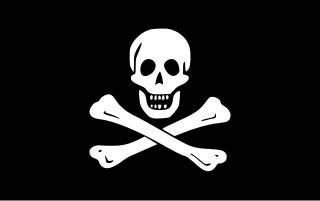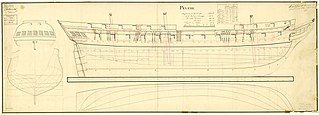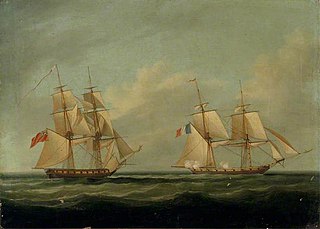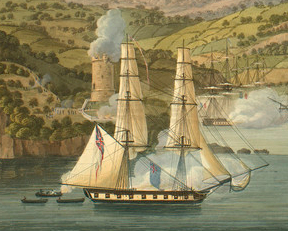
Piracy is an act of robbery or criminal violence by ship or boat-borne attackers upon another ship or a coastal area, typically with the goal of stealing cargo and other valuable goods. Those who conduct acts of piracy are called pirates, and vessels used for piracy are called pirate ships. The earliest documented instances of piracy were in the 14th century BC, when the Sea Peoples, a group of ocean raiders, attacked the ships of the Aegean and Mediterranean civilisations. Narrow channels which funnel shipping into predictable routes have long created opportunities for piracy, as well as for privateering and commerce raiding.

A privateer is a private person or vessel which engages in commerce raiding under a commission of war. Since robbery under arms was a common aspect of seaborne trade, until the early 19th century all merchant ships carried arms. A sovereign or delegated authority issued commissions, also referred to as letters of marque, during wartime. The commission empowered the holder to carry on all forms of hostility permissible at sea by the usages of war. This included attacking foreign vessels and taking them as prizes and taking crews prisoner for exchange. Captured ships were subject to condemnation and sale under prize law, with the proceeds divided by percentage between the privateer's sponsors, shipowners, captains and crew. A percentage share usually went to the issuer of the commission.

A letter of marque and reprisal was a government license in the Age of Sail that authorized a private person, known as a privateer or corsair, to attack and capture vessels of a foreign state at war with the issuer, licensing international military operations against a specified enemy as reprisal for a previous attack or injury. Captured naval prizes were judged before the government's admiralty court for condemnation and transfer of ownership to the privateer.

The Embargo Act of 1807 was a general trade embargo on all foreign nations that was enacted by the United States Congress. As a successor or replacement law for the 1806 Non-importation Act and passed as the Napoleonic Wars continued, it represented an escalation of attempts to persuade Britain to stop any impressment of American sailors and to respect American sovereignty and neutrality but also attempted to pressure France and other nations in the pursuit of general diplomatic and economic leverage.
Prize money refers in particular to naval prize money, usually arising in naval warfare, but also in other circumstances. It was a monetary reward paid in accordance with the prize law of a belligerent state to the crew of a ship belonging to the state, either a warship of its navy or a privateer vessel commissioned by the state. Prize money was most frequently awarded for the capture of enemy ships or of cargoes belonging to an enemy in time of war, either arrested in port at the outbreak of war or captured during the war in international waters or other waters not the territorial waters of a neutral state. Goods carried in neutral ships that are classed as contraband, being shipped to enemy-controlled territory and liable to be useful to it for making war, were also liable to be taken as prizes, but non-contraband goods belonging to neutrals were not. Claims for the award of prize money were usually heard in a prize court, which had to adjudicate the claim and condemn the prize before any distribution of cash or goods could be made to the captors.

The Anglo-Russian War was a war between the United Kingdom and the Russian Empire which lasted from 2 September 1807 to 18 July 1812 during the Napoleonic Wars. It began after Russia signed the Treaty of Tilsit with the First French Empire, which ended hostilities between the two nations. During the war, actual military engagements were limited primarily to minor naval actions in the Baltic Sea and Barents Sea.
Numerous British vessels have borne the name Prince of Wales, after the then current Prince of Wales, the title borne by the heir-presumptive to the throne of the United Kingdom.

In admiralty law prizes are equipment, vehicles, vessels, and cargo captured during armed conflict. The most common use of prize in this sense is the capture of an enemy ship and its cargo as a prize of war. In the past, the capturing force would commonly be allotted a share of the worth of the captured prize. Nations often granted letters of marque that would entitle private parties to capture enemy property, usually ships. Once the ship was secured on friendly territory, it would be made the subject of a prize case: an in rem proceeding in which the court determined the status of the condemned property and the manner in which the property was to be disposed of.

HMS Northumberland was a 74-gun third-rate ship of the line of the Royal Navy, built at the yards of Barnard, Deptford and launched on 2 February 1798. She carried Napoleon to his final exile on St Helena.
USS Gallatin was a post-Revolutionary War sailing vessel that the U.S. Department of the Treasury purchased at Norfolk, Virginia, for the United States Revenue-Marine in December 1807. An explosion on board destroyed her in 1813.

Psyché was a 36-gun vessel built between February 1798 and 1799 at Basse-Indre (Nantes) as a privateer. As a privateer she had an inconclusive but bloody encounter with HMS Wilhelmina of the Royal Navy, commanded by Commander Henry Lambert, off the Indian coast in April 1804. The French then brought her into service in June 1804 as the frigate Psyché. In February 1805 she encountered HMS St Fiorenzo, under the command of the same Henry Lambert, now an acting captain. After a sanguinary engagement of over three hours, Psyché surrendered. The British took her into service as HMS Psyche. In British service she captured several prizes and took part in the capture of Mauritius and in an operation in Java. She was broken up at Ferrol in 1812.

Surveillante entered service as a 40-gun Virginie-class frigate of the French Navy. She was surrendered to the British in 1803, after which she served in the Royal Navy, classed under the British system as a 38-gun vessel, until 1814 when she was decommissioned. HMS Surveillante had a long and active career under two successful and distinguished commanders, from the Baltic to the northwestern coasts of France, Spain and Portugal, and was present at the Battle of Copenhagen (1807) and throughout the Peninsula War. Her record as a taker of prizes is notable for its success, particularly towards the end of her career.

HMS Curieux was a French corvette launched in September 1800 at Saint-Malo to a design by François Pestel, and carrying sixteen 6-pounder guns. She was commissioned under Capitaine de frégate Joseph-Marie-Emmanuel Cordier. The British captured her in 1804 in a cutting-out action at Martinique. In her five-year British career Curieux captured several French privateers and engaged in two notable single-ship actions, also against privateers. In the first she captured Dame Ernouf; in the second, she took heavy casualties in an indecisive action with Revanche. In 1809 Curieux hit a rock; all her crew were saved but they had to set fire to her to prevent her recapture.

HMS Scout was a Cruizer-class brig-sloop built by Peter Atkinson & Co. at Hull and launched in 1804. She participated in a number of actions and captured several privateers in the Mediterranean during the Napoleonic Wars. The Navy sold her in 1827. In 1829 she reappeared as the British Southern Whale Fisheries whaler Diana. Diana made three voyages for Daniel Bennett & Son until condemned after an on-board explosion in April 1843 towards the end of her fourth voyage.
Sir John Sherbooke of Saint John, New Brunswick was originally the American brig New Orleans Packet that HMS Guerriere detained in August 1811 and that was condemned at Saint John. Local merchants purchased her and named her after Sir John Coape Sherbrooke, Governor of Nova Scotia. After the outbreak of the War of 1812 she acquired a letter of marque. An American privateer captured her in October 1813.

HMS Musquito. was a Royal Navy Cruizer-class brig-sloop built by John Preston at Great Yarmouth and launched in 1804. She was commissioned in October 1804 under Commander Samuel Jackson. She served in the North Sea and the Baltic, and Jackson supervised the first successful rocket attack in Europe at Boulogne in 1806. After the war she served off Africa and captured some slavers. She was broken up in 1822, having been laid up since 1818.
HMS Decouverte was the French schooner Eclipse, launched in 1804, that was captured in 1806. The Royal Navy took her into service as HMS Decouverte. She served in the Caribbean, where she captured two privateers, one French and one American. She was sold in 1816.
Malartic, was a French privateer ship, famous for her exploits while under the command of Captain Jean-Marie Dutertre. The British captured her in 1800, ending her brief, but productive privateering career.

HMS Royalist was launched in 1807. She captured many privateers and letters of marque, most French, but also some from Denmark and the United States. Her crew twice were awarded the Naval General Service Medal. She was instrumental in the capture of a French frigate. The Royal Navy sold her in 1819. She then became a whaler, making three complete voyages. She was condemned after a mishap while on her fourth.












